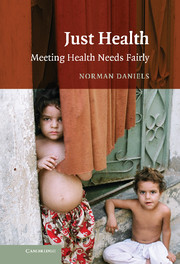Book contents
- Frontmatter
- Contents
- Acknowledgments
- Introduction
- PART I A THEORY OF JUSTICE AND HEALTH
- 1 Three Questions of Justice
- 2 What Is the Special Moral Importance of Health?
- 3 When Are Health Inequalities Unjust?
- 4 How Can We Meet Health Needs Fairly When We Can't Meet Them All?
- 5 What Do We Owe Each Other?
- PART II CHALLENGES
- PART III USES
- References
- Index
5 - What Do We Owe Each Other?
Implications of an Integrated Theory of Justice and Health
Published online by Cambridge University Press: 05 June 2012
- Frontmatter
- Contents
- Acknowledgments
- Introduction
- PART I A THEORY OF JUSTICE AND HEALTH
- 1 Three Questions of Justice
- 2 What Is the Special Moral Importance of Health?
- 3 When Are Health Inequalities Unjust?
- 4 How Can We Meet Health Needs Fairly When We Can't Meet Them All?
- 5 What Do We Owe Each Other?
- PART II CHALLENGES
- PART III USES
- References
- Index
Summary
In the previous three chapters, I have answered the three Focal Questions that a theory of justice for health must answer. First, health is of special moral importance because protecting normal functioning helps to protect the range of exercisable opportunities open to people and because various theories of justice support the idea that we have an obligation to protect opportunity and thus health. Second, a health inequality is unjust when it results from an unjust distribution of the socially controllable determinants of population health, as illustrated by Rawls's (1971) principles of justice as fairness. In effect, we cannot have health equity without broader social justice. Finally, to meet health needs fairly, we must supplement the principles of justice that emerge in answering the first two questions with a fair, deliberative process.
Do these answers work together to address the Fundamental Question with which we began? Do they tell us what we owe each other to promote and protect health in a population and to assist people when they are ill or disabled? To see whether or not they do, we must now examine the general implications of our answers for some of the major policy problems that bear on the just distribution of health. Do we owe each other universal promotion and protection of health – not only in universal coverage for medical services but in equitable protection against health risks through both public health and non-health-sector measures that affect health?
- Type
- Chapter
- Information
- Just HealthMeeting Health Needs Fairly, pp. 140 - 158Publisher: Cambridge University PressPrint publication year: 2007



